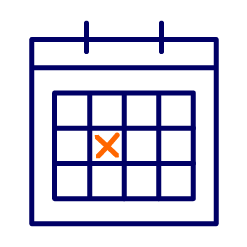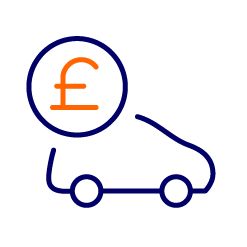Business Car Leasing Explained
Whether you're a large corporation looking for a fleet of vehicles for your sales staff, or a sole trader looking for a van to conduct your day-to-day business, business car leasing offers many advantages compared to buying a car through a bank or dealer finance.
There's a lot to learn about business car leasing, that's why we've put together a comprehensive guide explaining the benefits and drawbacks, as well as the different types of business leasing contracts available.
Find what you're looking for in our guide:

Business car leasing is a long-term rental agreement designed for all types of businesses, including sole traders, partnerships and limited companies. There are five different types of lease contracts available for businesses, including Business Contract Hire, Business Contract Purchase, Finance Lease and Business Lease Purchase. Each contract type is different and the best choice for your business will depend on your specific needs and circumstances.
It works similarly to how a personal car lease contract does:
- Browse from our selection of cars and vans to find the perfect vehicle.
- Agree to an initial rental, annual mileage amount, and lease length. All of which can be adjusted according to your business needs.
- Your business will then undergo a car lease credit check to see if you are financially eligible.
- Get your vehicle (or vehicles) delivered where you need them and get your business on the road.
At the end of the lease contract (depending on the type of contract taken out), the vehicle is returned to the finance provider.
Business car leasing has become increasingly popular with businesses of all sizes who are looking to obtain company cars become of its many benefits.

Fixed monthly rentals
Leasing offers fixed, affordable monthly rentals which can be spread over an agreed period of time. This makes budget planning easier, while contract and mileage terms are flexible to suit your business requirements.

Better cash flow
Unlike buying, which is capital intensive, business leasing is an additional line of credit, meaning you can free up money to invest in your business and ease any cash flow worries.

No depreciation risks
According to the Money Advice Service, the value of a vehicle typically decreases between 15-35% in the first year and up to 50% or more over three years. However, by leasing, the depreciation risk is taken on by the vehicle’s finance provider so you don't have to worry about the depreciation or disposal of the vehicle at the end of the contract.

Brand new vehicles
With a business leasing contract, you have the option to change your vehicle every two to four years, benefiting from new luxury car lease deals, ever-improving technology, security and safety features found on new vehicles.

Access to electric vehicles

VAT recoverable
Limited companies can recover up to 100% of the payments and VAT against their corporation tax if the vehicle is solely for business use or up to 50% if the car has some private usage.

Easy maintenance
Maintenance and servicing can also be included in the monthly rental, helping to spread the cost and minimise downtime for drivers. Plus, if you chose to take out a maintenance package with your company vehicle, you can claim up to 100% back on that too.

Simplified fleet management
Leasing allows your business to adapt to business changes more efficiently. Whether you are looking to scale your business up or cut back, business car leasing gives you more freedom compared to buying the vehicles outright.
As with most financial contracts, there are some potential drawbacks that you need to consider before deciding if business car leasing is suitable for you and your business.

Mileage restrictions
When signing for the business lease, you pre-agree to an annual mileage amount. If you exceed this pre-agreed mileage, you will be liable for excess mileage charges which can prove costly.

Fair wear and tear
You need to return the car in good condition and within fair wear and tear guidelines. This means you and any employees must keep the vehicle in good condition. Any damage to the vehicle beyond the BVRLA fair wear and tear guidelines means you may be liable for damage charges. Check out our Leasing Wear and Tear Guide for more information.

You won't own the vehicle
Depending on the type of lease contract, most new car lease deals don’t offer an ownership option so you will not own the vehicle at any point during the contract.

Early termination fees
If you choose to cancel your lease agreement early because you no longer need the vehicle, you will have to pay early termination fees.

Company car tax for employees
In some cases, it can be considerably more expensive for employees to take out a business car lease rather than a personal car lease due to company car tax. Keep in mind that the higher the CO2 emissions of the vehicle, the higher the company car tax will be, therefore it is important to choose a vehicle with low CO2 emissions for lower BIK rates.
There are several types of business lease contracts, offering differences for a range of businesses and financial positions. We've detailed each of these below and what they can each offer.
Business contract hire is a long-term vehicle rental agreement suitable for limited companies, partnerships and sole traders. It's an excellent option for VAT-registered companies, as you can claim back up to 100% of the payments if the vehicle is solely for business use or up to 50% if the car has some private usage. It's essential to understand that your company won't own the vehicle at the end of the contract, however, contract hire eliminates having a depreciating asset on your company's balance sheet.
Business Contract Purchase is ideal for businesses that want to own their vehicles and avoid the risk of having depreciating assets. Your company selects a brand new vehicle and pays an initial rental, followed by fixed monthly instalments throughout the length of the contract. With a business contract purchase, at the end of the contract, your business has the option to purchase the vehicle for a pre-agreed price.
A finance lease is great for businesses where contract hire is not suitable. This type of leasing offers flexibility and tax advantages to companies who require one or more vehicles but don't have the money to pay for them upfront.
You can choose to pay a lower monthly rental with a final payment based on the estimated resale value of the vehicle (balloon payment), or alternatively, you can pay the entire cost of the vehicle, including interest charges, over an agreed period. Throughout the agreement, you don't own the vehicle as it remains the property of the finance company.
Business Lease Purchase is a lease agreement designed to offer dedicated vehicle funding if your company eventually wishes to buy the vehicle, but doesn’t want to spend the money up front. A lease purchase is essentially a finance package and does not include maintenance or other added-value services, such as those offered when taking out a contract purchase agreement.

We've covered several of the most frequently asked questions on business car leasing, so if you're struggling with any part of leasing, learn more below:
Business car leasing is intended for the following business types:
- VAT registered companies
- Sole traders with a bank account in the sole trading name
- Partnerships with two or more partners working in the business
- Limited companies
- Private limited companies
- Limited liability partnerships
- Charities
To lease a vehicle, your business will need to undergo a credit check as part of the finance application process. Finance providers use this credit check information and details on your application to make a final decision.
A good credit report is not the sole factor in being eligible for business leasing but can play a part in your chances of getting accepted for a business lease contract.
If your business is less than two years old you might be asked to produce additional paperwork such as three months' business bank statements, a director's guarantee (ltd companies only) and management accounts (if available).
Occasionally, a larger initial rental may also be required. This is because it is difficult for the finance provider to gain insight into the business and the potential lending risks involved.
When applying for a business lease contract, you will have to fill out a business finance application form. You will be asked to provide the following information:
- Company details such as registered name, registered address, company registration number, VAT number (if applicable) and annual turnover
- Director details including their name, address, marital status and date of birth
- Company bank details including bank name, sort code and account number
If you have previously been denied vehicle finance or if the business being less than two years old, you may be asked to provide some additional information such as:
- Three months' business bank statements
- Management account
- A director's guarantee
Take our brief interactive Is Your Business Eligible for Finance questionnaire below to determine if your business is likely to be accepted for finance.
One of the biggest advantages of business car leasing is the positive tax implications. Monthly instalments' cost can be claimed back as a business expense, along with car road tax and fuel, but the total amount you claim will depend on the vehicle's emissions.
If you intend to use your leased vehicle solely for business, you can claim back up to 100% of the VAT. However, If you want to use the vehicle for personal use, you can only claim back up to 50% of the VAT. It's essential to keep in mind that you can also claim up to 100% of the VAT if you choose to take out a maintenance package with your lease agreement.
With a business lease, the company covers all insurance costs and, in some cases fuel costs. The insurance certificate needs to be in a director's name or the company name. If an employee is expected to drive the vehicle, a letter on company headed paper may be needed. This confirms that the employee is authorised to drive the vehicle and to verify his/her position in the company.
Your new vehicle lease hire needs to be insured from the day of the delivery and must remain insured until the finance provider collects your vehicle. Proof of insurance is required before delivery can take place. This must be a fully comprehensive insurance policy, and the certificate must show your name, registration number, and date on or before your delivery date.
If your business owns multiple vehicles, you may want to look at fleet insurance as it can also be tailored to your business demands and save you money in the long run.
With a Business Contract Hire and Finance Lease, you don't have the option to buy the vehicle at the end of the lease contract. However, with a Business Contract Purchase and Business Lease Purchase, you can take ownership of the vehicle at the end of its contract if you desire.
If you think business car leasing is right for you, browse our range of business lease deals to choose from a wide range of vehicles. We'll need your to tell us your estimated annual mileage, preferred initial rental and contract length. Road tax is included in the cost, so you don't need to worry about paying for that separately.
Once you've agreed to your contract, we'll deliver your car to your front door for free (exclusions apply). Your monthly payments will then start, allowing you to drive and enjoy a brand-new car for the length of your agreement.
For more information on the different types of business leasing offers, check out our comprehensive guides on Business Vehicle Leasing or call Nationwide Vehicle Contracts on 0345 811 9595 for expert advice.
Guide Information
Originally published: 26th May 2021
Last updated: 18th November 2024
